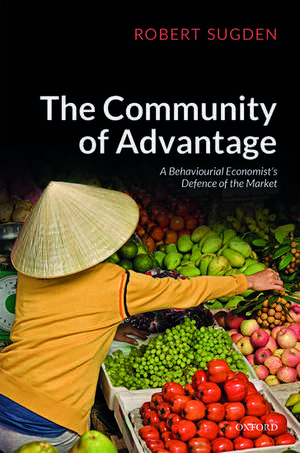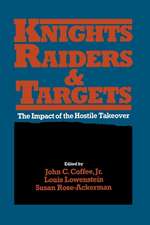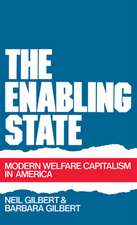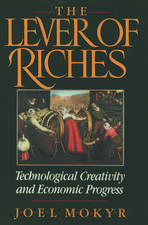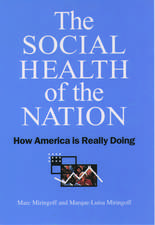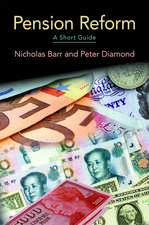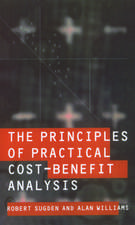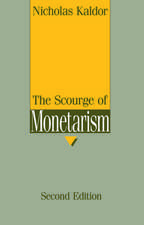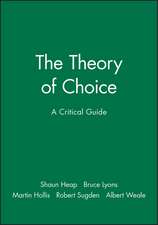The Community of Advantage: A Behavioural Economist's Defence of the Market
Autor Robert Sugdenen Limba Engleză Hardback – 17 iul 2018
Preț: 255.93 lei
Nou
Puncte Express: 384
Preț estimativ în valută:
48.97€ • 51.27$ • 40.52£
48.97€ • 51.27$ • 40.52£
Carte disponibilă
Livrare economică 05-11 martie
Preluare comenzi: 021 569.72.76
Specificații
ISBN-13: 9780198825142
ISBN-10: 0198825145
Pagini: 352
Dimensiuni: 163 x 242 x 25 mm
Greutate: 0.7 kg
Editura: OUP OXFORD
Colecția OUP Oxford
Locul publicării:Oxford, United Kingdom
ISBN-10: 0198825145
Pagini: 352
Dimensiuni: 163 x 242 x 25 mm
Greutate: 0.7 kg
Editura: OUP OXFORD
Colecția OUP Oxford
Locul publicării:Oxford, United Kingdom
Recenzii
Sugden presents a thought-provoking, cogent, and important analysis of behavioural economics and its policy prescriptions.
wide-ranging, intriguing and sophisticated ... this book is essential reading to anyone who wants to get a grip on the role of markets in the age of behavioural economics.
Sugden's arguments... represent a plausible alternative to the orthodox approach and will push many within the mainstream to clarify their thinking. As such, it is an essential philosophical grounding for anybody with an interest in behavioural economics.
Robert Sugden is one of the world's most brilliant and deepest thinkers. A philosopher and an economist, he gets to the very core of the liberal tradition -- and he offers bold new perspectives on freedom, the role of the state, and the limits of paternalism. This is, I think, his best work, and one of the very few most important explorations of liberty in the last half-century.
In this book, behavioural economics insider Robert Sugden levels a powerful and erudite argument against the use of behavioural economics to justify paternalism. Adopting the âcontractarianâ perspective proposed by James Buchanan, Sugden draws on philosophy, historic and contemporary economics and political science to burnish the age-old idea that people should be given the freedom to chart their own course, and engage in free exchange with others who wish to do so. Even to readers who neither embrace Sugden's arguments nor accept his conclusions - a group among which I classify myself - this book is critical reading for those wishing to gain an understanding of the vigorous and vibrant debate taking place over the ethical and policy implication of behavioural economics.
Robert Sugden's The Community of Advantage is a daring response to the findings of behavioural economics that show that preferences that people reveal in their choices cannot serve as a foundation for normative economics. Instead of conjuring up rational preferences that supposedly hide beneath the flawed ones we observe, Sugden proposes a radical transformation of normative economics which assesses policies by the freedom they offer interacting individuals. Sugden's arguments are a serious challenge to normative economics as we know it, and his proposals offer a fascinating unexplored path toward a replacement.
For many years Robert Sugden has opened new pathways in economics and philosophy. This highly original monograph finally weaves together his views on rational decision, paternalism, freedom, and markets. Sugden's contractarian approach provides a much-needed alternative to libertarian paternalism, demonstrating that classic liberalism can be brought up-to-date with the latest research in behavioural economics. The Community of Advantage will become a compulsory reading for all philosophers and social scientists interested in the moral and political implications of economic science.
In this book, Sugden brings together his work over twenty years in experimental economics and economic/political philosophy to develop a defence of the liberal market order in terms of advantage, understood not in terms of preference satisfaction nor in objective metrics of well-being (such as Rawls primary goods) but rather in terms of expanded opportunity sets. Sugden is one of the most interesting and creative minds working at the interface between economics and ethics these days; and his engagement with this ambitious project is a contribution of major significance.
In this magisterial book, Robert Sugden provides a sophisticated defence of the market from a contractarian perspective and in doing so mounts a serious challenge to the argument that behavioural economics provides a justification for government paternalism. A must-read for all those interested in the respective roles of the market and government in making the world a better place.
Sugden is on a mission: to take off his pedestal that haloed figure of normative economics, the welfare planner. Its not any planners business to nudge you away from supposed psychological errors and restore some putative rationality to your choices. Sugden is a true pioneer in the analysis of both the positive and the normative dimensions of behavioural economics. His book, which weaves together arguments from economics, philosophy and psychology, is provocative, engaging, and tightly argued. It poses a fundamental challenge, from a liberal perspective, to behavioural welfare economics, and it is a must-read for all social scientists.
Can liberty be preserved while people are nudged to avoid decision errors they say they do not want to make? Read Robert Sugden, a classical liberal behavioural economist, on how opportunities for market discovery provide an answer in The Community of Advantage.
wide-ranging, intriguing and sophisticated ... this book is essential reading to anyone who wants to get a grip on the role of markets in the age of behavioural economics.
Sugden's arguments... represent a plausible alternative to the orthodox approach and will push many within the mainstream to clarify their thinking. As such, it is an essential philosophical grounding for anybody with an interest in behavioural economics.
Robert Sugden is one of the world's most brilliant and deepest thinkers. A philosopher and an economist, he gets to the very core of the liberal tradition -- and he offers bold new perspectives on freedom, the role of the state, and the limits of paternalism. This is, I think, his best work, and one of the very few most important explorations of liberty in the last half-century.
In this book, behavioural economics insider Robert Sugden levels a powerful and erudite argument against the use of behavioural economics to justify paternalism. Adopting the âcontractarianâ perspective proposed by James Buchanan, Sugden draws on philosophy, historic and contemporary economics and political science to burnish the age-old idea that people should be given the freedom to chart their own course, and engage in free exchange with others who wish to do so. Even to readers who neither embrace Sugden's arguments nor accept his conclusions - a group among which I classify myself - this book is critical reading for those wishing to gain an understanding of the vigorous and vibrant debate taking place over the ethical and policy implication of behavioural economics.
Robert Sugden's The Community of Advantage is a daring response to the findings of behavioural economics that show that preferences that people reveal in their choices cannot serve as a foundation for normative economics. Instead of conjuring up rational preferences that supposedly hide beneath the flawed ones we observe, Sugden proposes a radical transformation of normative economics which assesses policies by the freedom they offer interacting individuals. Sugden's arguments are a serious challenge to normative economics as we know it, and his proposals offer a fascinating unexplored path toward a replacement.
For many years Robert Sugden has opened new pathways in economics and philosophy. This highly original monograph finally weaves together his views on rational decision, paternalism, freedom, and markets. Sugden's contractarian approach provides a much-needed alternative to libertarian paternalism, demonstrating that classic liberalism can be brought up-to-date with the latest research in behavioural economics. The Community of Advantage will become a compulsory reading for all philosophers and social scientists interested in the moral and political implications of economic science.
In this book, Sugden brings together his work over twenty years in experimental economics and economic/political philosophy to develop a defence of the liberal market order in terms of advantage, understood not in terms of preference satisfaction nor in objective metrics of well-being (such as Rawls primary goods) but rather in terms of expanded opportunity sets. Sugden is one of the most interesting and creative minds working at the interface between economics and ethics these days; and his engagement with this ambitious project is a contribution of major significance.
In this magisterial book, Robert Sugden provides a sophisticated defence of the market from a contractarian perspective and in doing so mounts a serious challenge to the argument that behavioural economics provides a justification for government paternalism. A must-read for all those interested in the respective roles of the market and government in making the world a better place.
Sugden is on a mission: to take off his pedestal that haloed figure of normative economics, the welfare planner. Its not any planners business to nudge you away from supposed psychological errors and restore some putative rationality to your choices. Sugden is a true pioneer in the analysis of both the positive and the normative dimensions of behavioural economics. His book, which weaves together arguments from economics, philosophy and psychology, is provocative, engaging, and tightly argued. It poses a fundamental challenge, from a liberal perspective, to behavioural welfare economics, and it is a must-read for all social scientists.
Can liberty be preserved while people are nudged to avoid decision errors they say they do not want to make? Read Robert Sugden, a classical liberal behavioural economist, on how opportunities for market discovery provide an answer in The Community of Advantage.
Notă biografică
Robert Sugden is Professor of Economics at the University of East Anglia, Norwich. He has been a prominent behavioural and experimental economist since the pioneering era of the 1980s. He is also well known for his work in economic theory, methodology of economics, and philosophy of economics. He is the author of The Economics of Rights, Cooperation and Welfare, Experimental Economics: Re-thinking the Rules, and many papers in leading journals of economics and philosophy. Recently his work has focused on reformulating normative economics so that it avoids unrealistic assumptions about individual rationality without becoming paternalistic.
